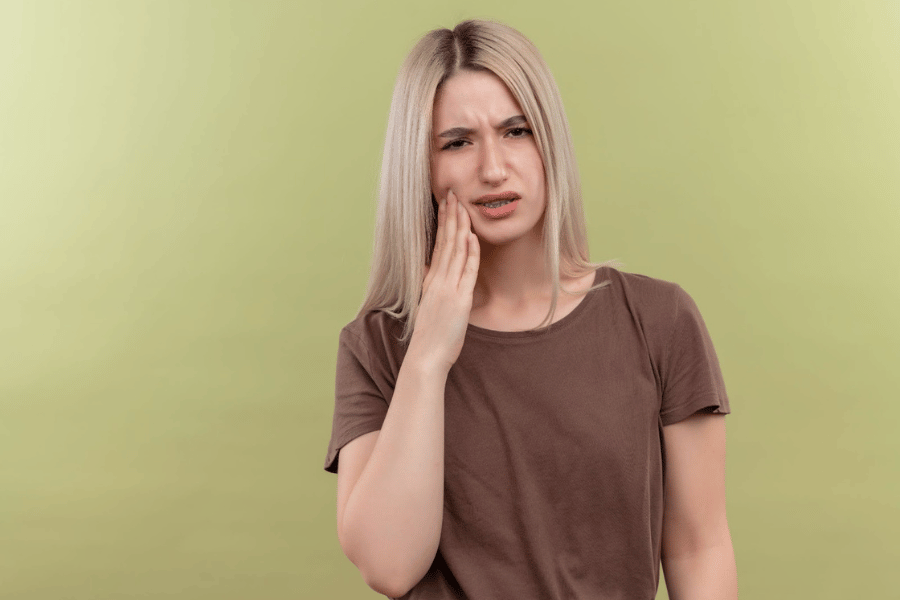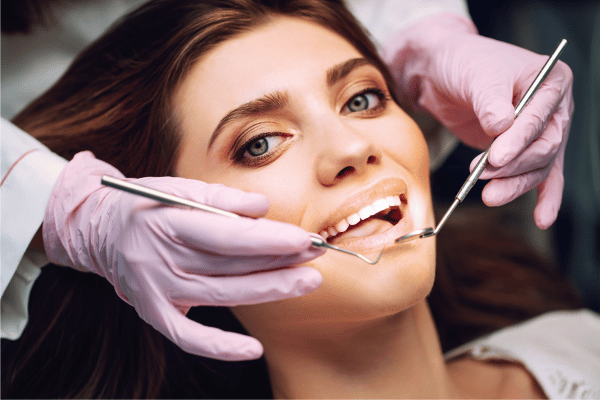
Table of contents
In this thorough guide, explore receding gums, a common dental issue. We'll discuss what receding gums are, warning signals to look out for, and the different causes of the issue. We'll also discuss the significance of obtaining professional treatment and the possible repercussions of receding gums.
So let's begin.
What are Receding Gums?
Gingival recession, another name for receding gums, is the result of the gum tissue around your teeth beginning to shrink. More of the tooth's surface, including the delicate root region, is now visible. This may result in a variety of dental problems as well as cosmetic issues.
Down here you’ll find more crucial information about this issue and how you can help yourself to protect.
Signs and Symptoms
To effectively manage receding gums, early identification is essential. Here are a few typical indicators to watch out for
- Increased teeth sensitivity to sweet, chilly, or hot foods and beverages.
- Teeth that seem longer than normal.
- Exposed roots of teeth.
- Pockets developing between the gums and teeth.
- Obvious recession of the gums at the gum line.
Causes of Receding Gums
To prevent and treat receding gums, it is essential to understand their underlying causes.
- Gum Disease: One of the main causes is untreated gum disease, often known as periodontitis or gingivitis. Gum tissue can be harmed by inflammation and infections.
- Improper Brushing: Using a hard-bristled brush or brushing too firmly will eventually erode the gum line.
- Bad Dental Hygiene: Insufficient brushing and flossing can lead to plaque accumulation, exacerbating gum recession.
- Genetics: A person's family history may make them more prone. Good dental hygiene can, however, lessen the risk.
- Use of Tobacco: Chewing and smoking tobacco irritate and harm gum tissues, which causes recession.
- Hormonal Changes: Women's hormones can change during menopause or pregnancy, which can have an impact on gum health.
- Grinding Your Teeth: Bruxism, or habitual teeth grinding, can place too much pressure on your gums and result in a recession.
- Misaligned Teeth: Uneven pressure on the gums due to an incorrect bite or misaligned teeth can exacerbate recession.
Impact of Receding Gums
Your oral health may be greatly impacted by receding gums in several ways:
- Exposed tooth rootscause increased sensitivity in the teeth.
- The tooth decay risk is higher since exposed roots are not as well shielded as enamel is.
- If gum disease is not addressed, it will get worse.
- Long-lasting teeth and exposed roots cause aesthetic difficulties.
- Gum recession in extreme situations can result in loose teeth and possibly even tooth loss.
Treatment Options
The gum recession's reversibility is contingent upon its severity and underlying causes.

Below you will find some of the available treatments:
Early Intervention: In mild situations, the recession can be stopped, even partially reversed, with the help of dental care and lifestyle modifications. This entails practicing strict dental hygiene and brushing gently with a soft-bristled brush.
Expert Medical Care: Laser therapy, gum grafting or less invasive procedures can treat the problem in more advanced cases, hide exposed roots, and enhance the appearance of the gums.
The Key is Early Detection
The moment you suspect receding gums, get in touch with a dentist for a timely diagnosis and course of treatment. It is essential to seek early intervention to stop future damage and protect your dental health.
Maintaining Healthy Gums
The following actions can be taken to stop gum recession and preserve your teeth's best health:
Make time for routine dental exams to allow for monitoring and early intervention.
- If you grind your teeth at sleep, wear a mouthguard.
- Maintaining enough salivary flow requires being hydrated.
- Consume an antioxidant-rich, fruit- and vegetable-rich, well-balanced diet.
- Give up smoking to lower risk factors such as irritability and decreased immunity.
You can keep your gums healthy and your smile attractive by learning about the causes and effects of receding gums and taking preventative action.
Conclusion
Knowing the subtleties of receding gums is essential to sustaining good oral health and a beautiful smile. Through awareness of the symptoms, causes, and available treatments related to gingival recession, you can proactively stop the condition from worsening and take quick care of any difficulties that already exist. Furthermore, although there may be a link between gum recession and tooth aligners that needs to be taken into account, related risks can be reduced by following good dental hygiene procedures and getting professional advice when undergoing orthodontic treatment.
For more information about clear aligners, you can call (888) 861-1884
FAQs
1. Can teeth aligners contribute to gum recession?
Teeth aligners, such as Aligner32, are designed to straighten teeth gradually. While there's no direct evidence suggesting aligners cause gum recession, improper use or poor oral hygiene during aligner treatment could potentially exacerbate existing gum issues.
2. Are receding gums reversible?
In mild cases, early intervention and proper dental care, such as addressing contributing factors and maintaining good oral hygiene, can help stop or partially reverse gum recession.
3. How can I prevent receding gums?
Preventing receding gums involves maintaining good oral hygiene practices, including gentle brushing with a soft-bristled brush, regular flossing, and attending routine dental checkups.
4. What are the risks of untreated receding gums?
Untreated receding gums can lead to several oral health issues, including increased tooth sensitivity, a higher risk of tooth decay, worsening gum disease, aesthetic concerns due to exposed roots, and longer-looking teeth.
5. Can hormonal changes affect gum health?
Yes, hormonal fluctuations, such as those occurring during pregnancy or menopause, can impact gum health. Changes in hormone levels can make gums more susceptible to inflammation and infection, increasing the risk of gum disease.


